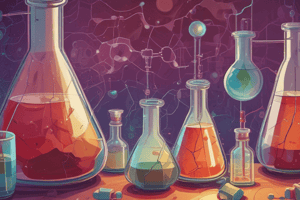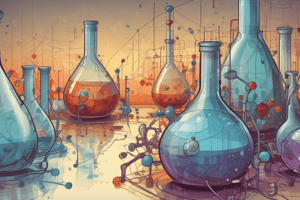Podcast
Questions and Answers
What is the main goal of analytical chemistry?
What is the main goal of analytical chemistry?
- To develop new analytical techniques
- To separate, identify, and quantify chemical compounds (correct)
- To study the properties of elements
- To synthesize new compounds
Which branch of analytical chemistry deals with the identification of chemical compounds or elements?
Which branch of analytical chemistry deals with the identification of chemical compounds or elements?
- Instrumental analysis
- Bioanalytical chemistry
- Quantitative analysis
- Qualitative analysis (correct)
What is the main difference between qualitative and quantitative analysis?
What is the main difference between qualitative and quantitative analysis?
- Qualitative analysis is used for organic compounds, while quantitative analysis is used for inorganic compounds
- Qualitative analysis is faster, while quantitative analysis is more accurate
- Qualitative analysis identifies compounds, while quantitative analysis determines their amount (correct)
- Qualitative analysis is used for small samples, while quantitative analysis is used for large samples
What is the importance of sampling and sample preparation in analytical chemistry?
What is the importance of sampling and sample preparation in analytical chemistry?
What is the purpose of spectroscopy in analytical chemistry?
What is the purpose of spectroscopy in analytical chemistry?
What is the primary purpose of quality control measures in analytical chemistry?
What is the primary purpose of quality control measures in analytical chemistry?
What is the main principle of gravimetric analysis?
What is the main principle of gravimetric analysis?
What is titrimetric analysis used for?
What is titrimetric analysis used for?
What is a key application of analytical chemistry in the pharmaceutical industry?
What is a key application of analytical chemistry in the pharmaceutical industry?
What is the main application of analytical chemistry?
What is the main application of analytical chemistry?
What is a recent advancement in analytical chemistry?
What is a recent advancement in analytical chemistry?
What is a benefit of nanotechnology in analytical chemistry?
What is a benefit of nanotechnology in analytical chemistry?
What is mass spectrometry imaging used for?
What is mass spectrometry imaging used for?
What is an application of analytical chemistry in environmental analysis?
What is an application of analytical chemistry in environmental analysis?
What is a use of analytical chemistry in food and beverage analysis?
What is a use of analytical chemistry in food and beverage analysis?
What is an application of analytical chemistry in forensic analysis?
What is an application of analytical chemistry in forensic analysis?
What is the main application of advanced sensor technologies in analytical chemistry?
What is the main application of advanced sensor technologies in analytical chemistry?
What is the primary role of automation and robotics in analytical chemistry?
What is the primary role of automation and robotics in analytical chemistry?
What is the significance of integrating data analysis and artificial intelligence in analytical chemistry?
What is the significance of integrating data analysis and artificial intelligence in analytical chemistry?
What is a key challenge faced by analytical chemists in recent times?
What is a key challenge faced by analytical chemists in recent times?
What is the primary goal of analytical chemistry in various fields?
What is the primary goal of analytical chemistry in various fields?
What is the significance of analytical chemistry in environmental monitoring?
What is the significance of analytical chemistry in environmental monitoring?
What is the main application of advanced analytical techniques in food safety?
What is the main application of advanced analytical techniques in food safety?
What is the primary focus of analytical chemistry?
What is the primary focus of analytical chemistry?
What is the main principle of spectroscopic methods?
What is the main principle of spectroscopic methods?
What type of spectroscopy measures the absorption of infrared light?
What type of spectroscopy measures the absorption of infrared light?
What is the purpose of chromatographic methods?
What is the purpose of chromatographic methods?
What is the main difference between HPLC and GC?
What is the main difference between HPLC and GC?
What is the purpose of electrochemical methods?
What is the purpose of electrochemical methods?
What is the purpose of calibration in analytical chemistry?
What is the purpose of calibration in analytical chemistry?
What is the purpose of method validation in analytical chemistry?
What is the purpose of method validation in analytical chemistry?
What is the purpose of method verification in analytical chemistry?
What is the purpose of method verification in analytical chemistry?
Flashcards are hidden until you start studying
Study Notes
Introduction to Analytical Chemistry
- Analytical Chemistry deals with the separation, identification, and quantification of chemical compounds in various substances.
- It plays a crucial role in fields such as pharmaceuticals, environmental analysis, and forensic science.
- Branches of Analytical Chemistry include qualitative analysis, quantitative analysis, instrumental analysis, and bioanalytical chemistry.
Basic Principles of Analytical Chemistry
- Qualitative analysis aims to identify the presence or absence of specific chemical compounds or elements in a sample.
- Quantitative analysis focuses on determining the amount or concentration of those compounds.
- Analytical Chemistry utilizes a wide range of techniques and instruments, such as spectroscopy, chromatography, electrochemistry, and mass spectrometry.
- Sampling and sample preparation are crucial in Analytical Chemistry to ensure representative and reliable data.
Analytical Methods in Analytical Chemistry
- Classical methods include gravimetric and titrimetric analysis.
- Spectroscopic methods include UV-Vis, IR, and NMR spectroscopy.
- Chromatographic methods include HPLC and GC.
- Electrochemical methods include potentiometry and voltammetry.
Quality Assurance in Analytical Chemistry
- Calibration involves establishing a relationship between the instrument response and the analyte concentration using a set of known standards.
- Standardization ensures the accuracy and reliability of analytical methods by using certified reference materials.
- Method validation confirms that an analytical method is fit for its intended purpose by evaluating its performance characteristics.
- Quality control measures include the use of control samples, internal standards, and replicate analyses.
Applications of Analytical Chemistry
- Environmental analysis involves monitoring and assessing environmental pollutants in air, water, and soil samples.
- Pharmaceutical analysis ensures the safety, efficacy, and purity of drugs.
- Food and beverage analysis involves the detection of additives, contaminants, and allergens.
- Forensic analysis involves the analysis of evidence, such as drugs, fingerprints, DNA, and gunshot residues.
Advances in Analytical Chemistry
- Miniaturized and portable analytical devices enable on-site and real-time analysis.
- Nanotechnology has revolutionized analytical chemistry by enhancing sensitivity, selectivity, and detection limits of analytical methods.
- Mass spectrometry imaging combines mass spectrometry and imaging techniques to create two-dimensional maps of the spatial distribution of molecules in a sample.
- Sensor technologies have enabled the development of highly sensitive and selective analytical devices for various applications.
Challenges and Future Directions in Analytical Chemistry
- Emerging contaminants and analytes pose challenges to analytical chemists.
- Automation and robotics are being increasingly used in analytical chemistry to improve efficiency and reduce human error.
- Integration of data analysis techniques, such as chemometrics and machine learning, is crucial for extracting meaningful information and patterns from complex datasets.
Conclusion
- Analytical Chemistry is a critical field that involves the identification, quantification, and analysis of chemical compounds in various samples.
- Analytical Chemistry is essential in fields such as environmental monitoring, pharmaceutical development, food safety, and forensic investigations.
Studying That Suits You
Use AI to generate personalized quizzes and flashcards to suit your learning preferences.




